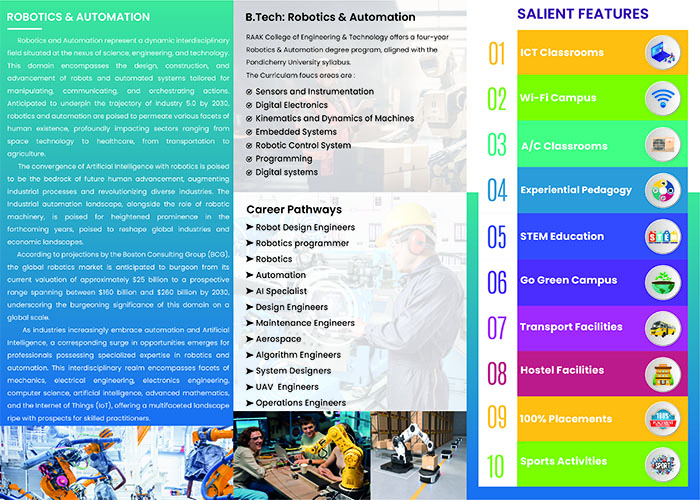Robotics & Automation * – Awaiting for the Approval of All India Council For Technical Education (AICTE)
ROBOTICS & AUTOMATION
The Department of ROBOTICS & AUTOMATION was established in the year 2024 with the aim of providing inclusive technology education to students from all over India and the world and thereby creating responsible citizens who would contribute to the betterment of their families, society and nation.
The Department aims at providing high quality training to students through the latest in Robotics & Automation technology. In order to maintain the standard of education, the Department constantly upgrades the academic syllabi so as to keep the students well trained to deal with changing trends in the field of Robotics & Automation.
DEPARTMENT VISION
The vision of Robotics & Automation department is to emerge as a world class technology department through education, innovation and collaborative research.
DEPARTMENT MISSION
- To impart quality education to students.
- To create and disseminate knowledge for the betterment of mankind.
- To encourage students to become self-motivated, problem solving individuals who can find and understand the knowledge needed to be successful in the profession.
- To establish a center of excellence in collaboration with industries, research laboratories and other agencies to meet the changing needs of society.
- To provide individual attention and enable character building.
- To empower the students with the required skills to solve the complex technological problems of modern society.
- To promote our graduates interpersonal and entrepreneurial skills that provide exposure and management within the industry’s diverse culture.
B.TECH – ROBOTICS & AUTOMATION
Robotics has been fascinating the mindset of human species in the last century. It has redefined the way humans have been advancing their lives. The word “robota” meaning work was coined by Czech playwright and author Karl Capek in 1921. Seemingly, today robotics is defining every aspect of human life and how humans are shaping the future of the world and universe at large.
First generation robotics was about automation of mechanical structure performing ordinary functions meant for humans. With the advent of electricity and electronics, programmable manipulators referred as industrial robots performing dull, difficult, dirty and dangerous tasks laid the foundation for industrial revolution and manufacturing industries. This era is referred as second-generation robotics. The third generation of robotics started with development of computing platforms like microprocessors, microcontrollers and reconfigurable computing devices. The fast-computing devices resulted in the growth of domestic robotics and completely automated the functioning industries by performing adventurous, augmentative, and adaptive tasks not feasible for humans.
The fourth-generation robotics based on artificial intelligence, machine learning and self learning systems coupled with rapid advancement in miniaturization of devices, sensors, driver systems, and actuators have resulted in lighter, smarter and intelligent systems. Space travel, deep sea exploration, defense vehicles, drones, medical surgery, domestic life and entertainment have been transformed by intelligent robotics systems.
The fifth generation of robotics combines reconfigurable mechanical structures like transformers, biology inspired systems and materials like cyborgs, intelligent integrative humanoids, and material science to replicate not just functionality of living things like humans but also extending the capabilities which were not possible decades ago. The real reason behind the human progress is to be defined by convergence of information technology, biotechnology, cognitive technology and material technology.
The recent breakthroughs in brain machine interfaces and the ease of transferring information between a digital system and living brain in tandem with virtual reality in a two-way communication system provides capabilities for the human species to explore space and time as never before.
Curriculum Focus:
| Humanities and Social Sciences | Professional Core Courses |
| English for Technical Writing | Power Electronics and Drives |
| Universal Human Values | Analog Electronics and Circuits |
| Management (Organizational Behaviour/ Finance & Accounting) | Strength of Materials |
| Humanities | Electronic Devices |
| Basic Science Courses | Sensors and Instrumentation |
| Chemistry | Control Systems |
| Mathematics-I (Matrices and Calculus) | Robotics |
| Biology for Engineers | Hydraulics and Pneumatics |
| Physics (Semi-conductor Physics) | Signals & Systems |
| Mathematics-II (Differential Equations, Fourier series and | Kinematics and Dynamics of Machines |
| its Applications) | Digital Electronics |
| Mathematics-III (Complex Analysis and Transform) | Microcontroller and Embedded Systems |
| Mathematics-IV (Statistics and Numerical Methods) | Programmable Logic Controller |
| Engineering Science courses | Mechatronics |
| Engineering Graphics & Design | Robotic Control Systems |
| Programming for Problem Solving | Programming for Robotics |
| Design Thinking | |
| Basic Electrical Engineering |
Career Pathways:
| Robotics Engineer | Autonomous machines |
| Robot Programmer | Robot engineer |
| Robotics Technician | Testing robots |
| Computer scientist | Algorithm Engineer |
| Design Engineer | Automation |
| Mechanical Engineer | Computer hardware engineer |
| Software engineer | Machine Learning Engineer |
| Aeronautical engineer | Technician |
| Sales Engineer | Designer |
| Automation Engineer |
ELIGIBILITY
Candidates should have passed the +2 (H.Sc.) (Academic) examination conducted by the Board of Higher Secondary Examination of Tamil Nadu, or any other equivalent examination thereto, with a minimum of 45% marks (40% marks for OBC / BCM / MBC / EBC / BT / SC / ST – candidates) in aggregate, in the prescribed subjects, namely, Mathematics, Physics and any one of the following optional subjects : Chemistry / Bio-Technology / Computer Science / Information Technology / Informatics Practices/ Technical Vocational Subject / Agriculture / Engineering Graphics / Business Studies/ Biology / (Botany & Zoology).
OR
Passed min. 3 years Diploma examination with at least
45% marks (40% marks in case of candidates belonging to reserved category) subject to vacancies in the First Year, in case the vacancies at lateral entry are exhausted.
(The Universities will offer suitable bridge courses such as Mathematics, Physics, Engineering drawing, etc., for the students coming from diverse backgrounds to achieve desired learning outcomes of the programme).
PROGRAM EDUCATIONAL OBJECTIVES
- Provide graduates with both fundamental and advanced knowledge of Robotics & Automation that prepares them for excellence, leadership roles along diverse career paths, and integrate ethical behavior.
- To provide training in soft skills via English language, communication, verbal, logical, analytical, comprehension, team building, inter personal relationship, group discussion etc., for placement.
- Provide graduates of the program will be employed in the Robotics & Automation profession, and will be engaged in learning, understanding, and applying new ideas and technologies as the field evolves.
- To inculcate the habit of lifelong learning for career development through successful completion of advanced degrees, professional development courses, industrial training etc.,
PROGRAM OUTCOMES
- Ability to apply knowledge of layered Artificial Intelligence domain, Data Science Algorithms and technologies in building advanced technological applications.
- Ability to understand professional and ethical responsibilities.
- Ability to apply the knowledge of Engineering and Management principles to manage projects as a team member or leader in multidisciplinary teams.
- Ability to apply knowledge of computing and mathematics appropriate to the discipline.
- An ability to identify, formulates, and develops solutions to computational challenges.
- An ability to design, implements, and evaluate a computational system to meet desired needs within realistic constraints.
- An ability to function effectively on teams to accomplish shared computing design, evaluation, or implementation goals.
- An understanding of professional, ethical, legal, security, and social issues and responsibilities for the computing profession.
- An ability to communicate and engage effectively with diverse stakeholders.
- An ability to analyze impacts of computing on individuals, organizations, and society.
- An ability to use appropriate techniques, skills, and tools necessary for computing practice.
- An ability to apply design and development principles in the construction of advanced software systems of varying complexity.

 UNIVISER
UNIVISER

